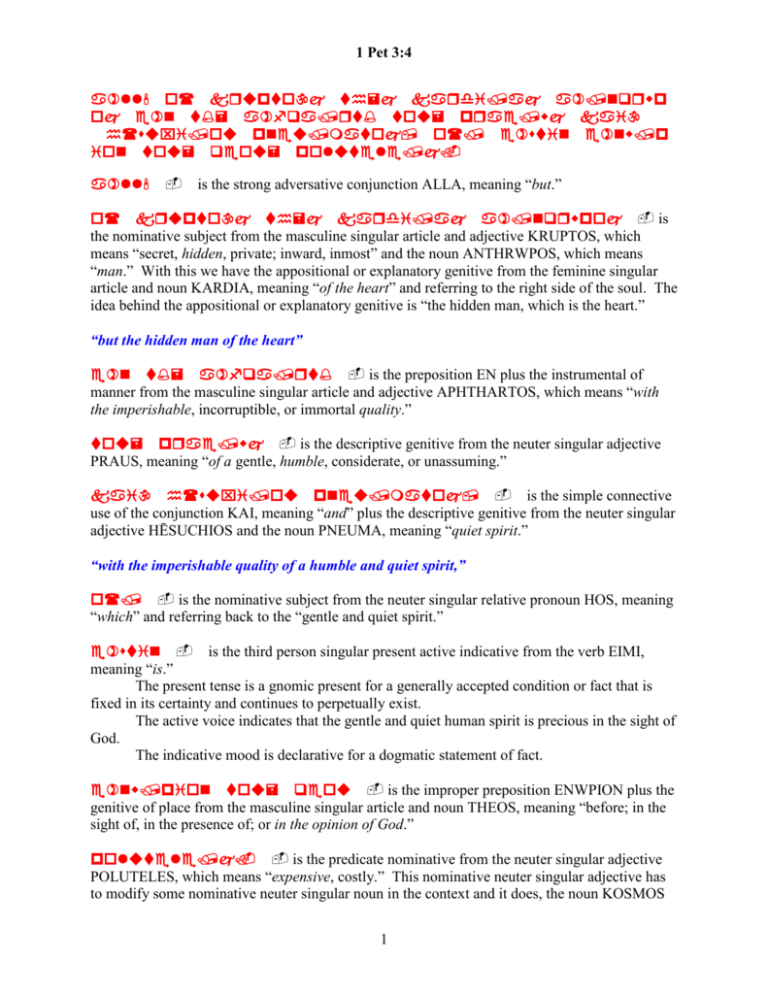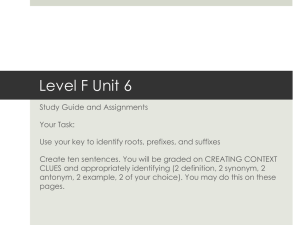1PET3_4 - Amador Bible Studies
advertisement

1 Pet 3:4 is the strong adversative conjunction ALLA, meaning “but.” is the nominative subject from the masculine singular article and adjective KRUPTOS, which means “secret, hidden, private; inward, inmost” and the noun ANTHRWPOS, which means “man.” With this we have the appositional or explanatory genitive from the feminine singular article and noun KARDIA, meaning “of the heart” and referring to the right side of the soul. The idea behind the appositional or explanatory genitive is “the hidden man, which is the heart.” “but the hidden man of the heart” is the preposition EN plus the instrumental of manner from the masculine singular article and adjective APHTHARTOS, which means “with the imperishable, incorruptible, or immortal quality.” is the descriptive genitive from the neuter singular adjective PRAUS, meaning “of a gentle, humble, considerate, or unassuming.” is the simple connective use of the conjunction KAI, meaning “and” plus the descriptive genitive from the neuter singular adjective HĒSUCHIOS and the noun PNEUMA, meaning “quiet spirit.” “with the imperishable quality of a humble and quiet spirit,” is the nominative subject from the neuter singular relative pronoun HOS, meaning “which” and referring back to the “gentle and quiet spirit.” is the third person singular present active indicative from the verb EIMI, meaning “is.” The present tense is a gnomic present for a generally accepted condition or fact that is fixed in its certainty and continues to perpetually exist. The active voice indicates that the gentle and quiet human spirit is precious in the sight of God. The indicative mood is declarative for a dogmatic statement of fact. is the improper preposition ENWPION plus the genitive of place from the masculine singular article and noun THEOS, meaning “before; in the sight of, in the presence of; or in the opinion of God.” is the predicate nominative from the neuter singular adjective POLUTELES, which means “expensive, costly.” This nominative neuter singular adjective has to modify some nominative neuter singular noun in the context and it does, the noun KOSMOS 1 1 Pet 3:4 at the end of verse 3. Therefore we can add the word “[adornment]” to this adjective as it is demanded from the ellipsis. “which keeps on being the expensive [adornment] in the opinion of God.” 1 Pet 3:4 corrected translation “but the hidden man of the heart with the imperishable quality of a humble and quiet spirit, which keeps on being the expensive [adornment] in the opinion of God.” Explanation: 1. The entire sentence reads, “Concerning which manner of life let it be not your external adornment—the braiding of hair and the wearing of gold or the putting on of fine clothes, but the hidden man of the heart with the imperishable quality of a humble and quiet spirit, which keeps on being the expensive [adornment] in the opinion of God.” 2. Your manner of life should be adorned with the imperishable quality of a gentle and quiet human spirit. a. Your manner of life is what goes on inside your heart—the right side of your soul where your thinking takes place. b. Your manner of life is not what you do as much as it is what you think. c. That thinking is characterized by a PRAUS and HESUCHIOS human spirit. d. The word PRAUS is used three other times in the New Testament. (1) Mt 5:5, “Blessed are the humble/unassuming, for they shall inherit the earth.” (2) Mt 11:29, “Take My yoke upon you, and learn from Me, for I am unassuming and humble in heart; and you shall find rest for your souls.” (3) Mt 21:5, “Say to the daughter of Zion, `Behold your King is coming to you, Humble/Unassuming, and mounted on a donkey, even on a colt, the foal of a beast of burden.’” (4) The best meaning of the word in all of these contexts is humble or unassuming, not gentle. e. Therefore, your manner of life must be characterized by a humble, unassuming human spirit. This is the expensive adornment of the right lobe of the soul in the opinion of God. f. The word HESUCHIOS is used only twice in the New Testament. The other occurrence is 1 Tim 2:2, “I command prayer ...for kings and all who are in authority, in order that we may lead a tranquil and quiet life in all godliness and respectability.” g. The quiet human spirit is one not aroused to social action, Christian activism, human do-goodism, or any form of rebellion against established authority. A quiet human spirit is one characterized by contentment, tranquility of soul, a personal sense of destiny, and total dependence upon God. This also is the expensive adornment of the right lobe of the soul in the opinion of God. 3. How do we adorn the human spirit in humility and quietness? a. First, you must learn what the Bible says about humility. b. Second, you must believe what the Bible says about humility. c. Third, you must apply what the Bible says about humility to yourself. d. Forth, you must use the rebound technique of 1 Jn 1:9 when you fail to maintain a humble and quiet spirit. 2 1 Pet 3:4 e. Fifth, you must use the problem solving devices of the spiritual life to maintain a humble and quiet spirit. f. Sixth, you must use your very own volition to want to acquire and have a humble and quiet spirit. 3






